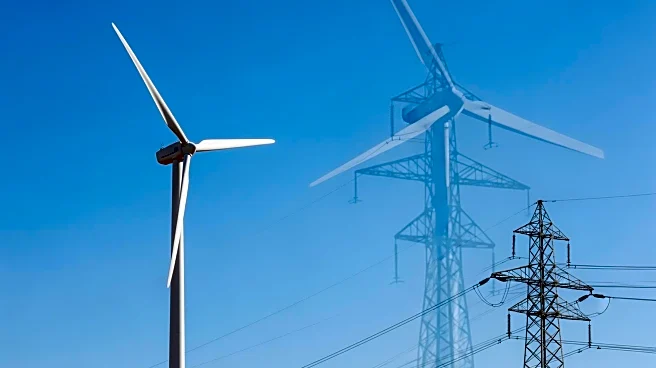What's Happening?
Idaho Power, one of Oregon's monopoly electric utilities, has filed a request with the Oregon Public Utilities Commission to lower rates for its residential customers in 2026. This proposal follows the utility's
decision to cease operations at a coal-burning power plant in Nevada and the decommissioning of the Boardman coal plant in eastern Oregon, which it co-owned with Portland General Electric. The company has saved $1.3 million from these actions, contributing to the proposed rate reduction. Idaho Power plans to end coal-burning operations at its last coal plant in Wyoming by 2030, transitioning to natural gas as part of its goal to achieve a 100% clean energy portfolio by 2045. The rate reduction, though modest at less than 1%, would benefit approximately 14,000 residential customers in eastern Oregon, potentially saving them less than a dollar a month.
Why It's Important?
The move by Idaho Power to reduce reliance on coal and lower customer rates is significant amid rising electricity costs across the U.S., driven by increased demand from data centers, AI processors, and bitcoin mining. While President Trump’s administration is investing in coal industry expansion, Idaho Power's actions highlight a shift towards cleaner energy sources, which are generally more cost-effective and environmentally friendly. This decision could set a precedent for other utilities to follow, potentially leading to broader adoption of clean energy and reduced electricity costs for consumers. The transition away from coal also aligns with global efforts to reduce greenhouse gas emissions, as coal is a major contributor to climate change.
What's Next?
Idaho Power's request for a rate reduction is expected to be reviewed by the Oregon Public Utilities Commission in early December. If approved, the rate decrease will be implemented in 2026. The company will continue its transition to natural gas and aims to achieve a fully clean energy portfolio by 2045. This shift may prompt other utilities to reconsider their energy sources and rate structures, especially in states heavily reliant on coal, where electricity rates have risen significantly. Stakeholders, including environmental groups and consumer advocates, will likely monitor these developments closely, advocating for sustainable energy practices and fair pricing.
Beyond the Headlines
Idaho Power's decision to move away from coal reflects broader ethical and environmental considerations. The transition to cleaner energy sources not only addresses climate change but also aligns with public demand for sustainable practices. This shift may influence cultural attitudes towards energy consumption and encourage further innovation in renewable energy technologies. Additionally, the company's actions could impact regulatory policies, prompting discussions on the balance between economic growth and environmental responsibility.










